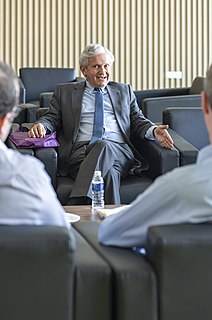Related Research Articles

The Keeper or Master of the Rolls and Records of the Chancery of England, known as the Master of the Rolls, is the President of the Civil Division of the Court of Appeal of England and Wales and Head of Civil Justice. As a judge, he or she is the second in seniority in England and Wales only to the Lord Chief Justice. The position dates from at least 1286, although it is believed that the office probably existed earlier than that.

The Buchanan Medal is awarded by the Royal Society "in recognition of distinguished contribution to the medical sciences generally". The award was created in 1897 from a fund to the memory of London physician Sir George Buchanan (1831–1895). It was to be awarded once every five years, but since 1990 the medal has been awarded every two years.

Justice of the Common Pleas was a puisne judicial position within the Court of Common Pleas of England and Wales, under the Chief Justice. The Common Pleas was the primary court of common law within England and Wales, dealing with "common" pleas. It was created out of the common law jurisdiction of the Exchequer of Pleas, with splits forming during the 1190s and the division becoming formal by the beginning of the 13th century. The court became a key part of the Westminster courts, along with the Exchequer of Pleas and the Court of King's Bench, but with the Writ of Quominus and the Statute of Westminster, both tried to extend their jurisdiction into the realm of common pleas. As a result, the courts jockeyed for power. In 1828 Henry Brougham, a Member of Parliament, complained in Parliament that as long as there were three courts unevenness was inevitable, saying that "It is not in the power of the courts, even if all were monopolies and other restrictions done away, to distribute business equally, as long as suitors are left free to choose their own tribunal", and that there would always be a favourite court, which would therefore attract the best lawyers and judges and entrench its position. The outcome was the Supreme Court of Judicature Act 1873, under which all the central courts were made part of a single Supreme Court of Judicature. Eventually the government created a High Court of Justice under Lord Coleridge by an Order in Council of 16 December 1880. At this point, the Common Pleas formally ceased to exist.
Eastman's Royal Naval Academy, originally in Southsea and later at Winchester, both in England, was a preparatory school. Between 1855 and 1923 it was known primarily as a school that prepared boys for entry to the Royal Navy. Thereafter, it was renamed Eastman's Preparatory School and continued until the 1940s. According to Jonathan Betts, it was "considered one of the top schools for boys intended for the Navy".
(William) John Poulton Maxwell Garnett was a British industrial relations campaigner who led The Industrial Society from 1962 until 1986.
The Phytologist was a British botanical journal, appearing first as Phytologist: a popular botanical miscellany. It was founded in 1841 as a monthly, edited by George Luxford. Luxford died in 1854, and the title was taken over by Alexander Irvine and William Pamplin, who ran it to 1863 with subtitle "a botanical journal".
References
- ↑ "Fellows of the Royal Society". London: Royal Society. Archived from the original on 16 March 2015.
- ↑ H. L. (1931). "Mr. A. B. Basset, F.R.S". Nature. 127 (3198): 244. Bibcode:1931Natur.127..244L. doi: 10.1038/127244a0 .
- ↑ Baker, Julian L. (10 October 1947). "Obituary Notice: H. T. Brown. Born July 20th, 1848. Died February 6th, 1925". Biochemical Journal. 19 (2): 165–7. doi:10.1042/bj0190165. PMC 1259153 . PMID 16743480.
- ↑ "Josiah Latimer Clark". Oxford Dictionary of National Biography (online ed.). Oxford University Press. doi:10.1093/ref:odnb/5469.(Subscription or UK public library membership required.)
- ↑ Chanda, Sunirmal; Caulton, Eric (1999). "David Douglas Cunningham (1843–1914): a biographical profile". Aerobiologia. 15 (4): 255–258. doi:10.1023/a:1007698905558. S2CID 81404819.
- ↑ "Lazarus Fletcher". Oxford Dictionary of National Biography (online ed.). Oxford University Press. doi:10.1093/ref:odnb/48260.(Subscription or UK public library membership required.)
- ↑ "obit. Sir Lazarus Fletcher, F.R.S." Nature. 106 (2672): 636–637. 13 January 1921. Bibcode:1921Natur.106..636.. doi: 10.1038/106636a0 .
- ↑ "Charles Thomas Hudson, M. A, LL". Journal of the Royal Microscopical Society. Wiley-Blackwell. 24 (1): 48–49. 1904. doi:10.1111/j.1365-2818.1904.tb00597.x.
- ↑ "Charles Thomas Hudson". Oxford Dictionary of National Biography (online ed.). Oxford University Press. doi:10.1093/ref:odnb/34034.(Subscription or UK public library membership required.)
- ↑ "Thomas McKenny Hughes". Oxford Dictionary of National Biography (online ed.). Oxford University Press. doi:10.1093/ref:odnb/37580.(Subscription or UK public library membership required.)
- ↑ Carpenter, G. D. H. (1944). "Edward Bagnall Poulton. 1856–1943". Obituary Notices of Fellows of the Royal Society . 4 (13): 655–680. doi: 10.1098/rsbm.1944.0014 .
- ↑ Power, Helen J (2001). "Poulton, Edward Bagnall". eLS. doi:10.1038/npg.els.0002456. ISBN 0470016175.
- ↑ Woodward, A. S.; Watts, W. W. (1938). "William Johnson Sollas. 1849–1936". Obituary Notices of Fellows of the Royal Society . 2 (6): 264. doi:10.1098/rsbm.1938.0007.
- ↑ "Charles Todd". Oxford Dictionary of National Biography (online ed.). Oxford University Press. doi:10.1093/ref:odnb/36530.(Subscription or UK public library membership required.)
- ↑ Epstein, Mortimer (1912). . Dictionary of National Biography (2nd supplement). London: Smith, Elder & Co.
- ↑ Hutchins, Roger. "Yeo, Gerald Francis". Oxford Dictionary of National Biography (online ed.). Oxford University Press. doi:10.1093/ref:odnb/37062.(Subscription or UK public library membership required.)
- ↑ Hartley, H. (1966). "Stanislao Cannizzaro, F.R.S. (1826–1910) and the First International Chemical Conference at Karlsruhe in 1860". Notes and Records of the Royal Society. 21 (1): 56–63. doi:10.1098/rsnr.1966.0006. ISSN 0035-9149. S2CID 58453894.
- ↑ Fye, W. Bruce (2003). "Jean-Baptiste Auguste Chauveau". Clinical Cardiology . 26 (7): 351–353. doi:10.1002/clc.4950260712. PMC 6654043 . PMID 12862303.
- ↑ Wilson, J. G.; Fiske, J., eds. (1900). . Appletons' Cyclopædia of American Biography . New York: D. Appleton.